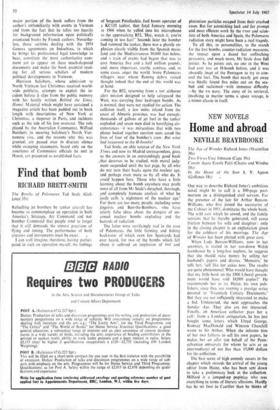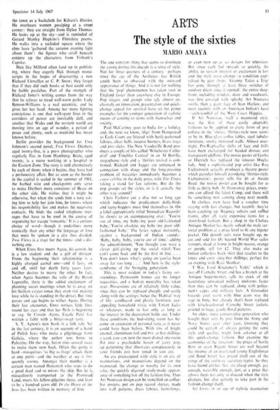NEW NOVELS
Home and abroad
NEVILLE BRAYBROOKE
Two Views Uwe Johnson (Cape 30s)
Cousin Agata Ercole Patti (Chatto and Windtis 18s)
In the Heart of the Seas S. Y. Agnon (Gollancz 18s)-
One way to describe Richard Jones's ambitiOus novel might be to call it a 300-page post- mortem
on a distinguished civil servant. For the presence of the late Sir Arthur Benson= Williams, who first joined the secretariat of the Cabinet in 1911, dominates the whole book. The wild oats which he sowed, and the family tensions that he thereby generated, still cause friction between his wife and daughter: only in the closing chapter is an explanation given • for the coldness of his marriage. The Age • of Wonder has been plotted with great care.
When Lady Benson-Williams, now in her seventies, is visited in her run-down Welsh farmhouse by a long-lost nephew, he suggests that she should raise money by selling her husband's papers and diaries. 'Memoirs,' he. tells her, 'sell like hot cakes now. The results are quite phenomenal. Who would have thought that my little book on the 1906 Liberal govern- ment would have sold 18,000 copies?' He recommends her to try Heinz, his own pub- lishers, since they are running a prestige series devoted to 'Twentieth Century Documents.' But they are not sufficiently interested to make a bid. Undeterred, she next approaches the Sunday Age. They also are not interested. Finally, an American collector pays her a call : from a London antiquarian, he has just bought some letters which Lloyd George, Ramsay MacDonald and Winston Churchill wrote to Sir Arthur. When she informs him
of her two failures to sell his own papers, he makes her an offer (on behalf of the Penn- sylvanian university for whom he acts as an intermediary) of not less than 15,000 dollars for the collection.
The best scene of high comedy occurs in the chapter which records the arrival of the young editor from Heinz, who has been sent down to take a- preliminary look at the collection. Milford is a jumped-up popinjay who sees everything in terms of literary allusions. Hardly has he set foot in Caerifor than he thinks of the town as a backcloth for Kilvert's Diaries. He overhears women gossiping at a street corner: they are straight from Dylan Thomas. He looks up at the sky—and is reminded of Gerard Manley Hopkins's Flintshire poems. lie walks into a secluded square where the elms have 'gathered the autumn evening light about them': the figures who stroll beneath conjure up the characters from Firbank's Caprice.
Men like Milford often land up in publish- ing, where they eagerly flick through manu- scripts in the hopes of discovering a new Richard Llewellyn or C. P. Snow; they forget that if they did such books at best could only be feeble pastiches. Part of the strength of Richard Jones's writing comes from the way that he refuses to tread well-worn paths. Lady Benson-Williams is a real eccentric, and he gives her her head. Among her more fighting convictions is one that well-spent lives in the corridors of power are inevitably dull, and another that Wales and the western world are moving into an age of wonder, a period of peace and plenty, such as mankind has never known before.
Berlin provides the background for Uwe Johnson's second novel, Two Views. Dietbert, aged twenty-five, is a press photographer who regularly flies in from Hamburg; Beate, aged twenty, is a nurse working in a hospital in the Eastern Zone. The story is told alternatively by each of them; when it begins, they have had a perfunctory affair. But as soon as the border in the capital is sealed in the summer of 1961, the barbed wire and checkpoints only serve to make Dietbert more conscious of Beate on the other side. He wishes that it might be otherwise, but when she sends him a note ask- ing him to help her join him, he knows where his responsibility lies and makes the necessary contacts. He finds the coded telephone mes- sages that have to be used in the course of organising her escape 'romantic.' It is a curious choice of word—though it underlines more ironically than any other the language of love that must be spoken in a city thus divided. Two Views is a tract for the times—and a dis- turbing one.
When Enzo first meets Agata, his cousin, he is a law student and she a girl of thirteen. From the beginning their relationship is a highly charged carnal one—and it lasts, on and off, until her death forty years later. Neither desires to marry the other. In fact, when Agata becomes the wife of the Baron Leporello, there is the added excitement of planning secret meetings when he is away on his Sicilian estates (once they even risk making love while he is standing in the drive). But time passes and age begins to wither Agata. During their last encounter, Enzo notices little lines round her eyes and that her flesh is beginning to sag. In. Cousin Agata, Ercole Patti has written a fable with a bitter-sweet taste.
S. Y. Agnon's new book is a folk tale. Set in the last century, it is an account of a band of Polish Jews who make a pilgrimage from Galicia, where the author was born, to Palestine. On the way, Satan tries several ruses to make them turn back. Often the going is hard—mosquitoes 'as big as frogs' attack them at one point—and the weather at sea is fre- quently stormy. Amongst their number is a certain man named Hananiah who stops to do a good deed and so misses the ship. But he miraculously transported to the Promised/ Land, meets his fellow-pilgrims there, and lives to be a hundred years old. In the Heart of the Seas has been written in memory of him.































 Previous page
Previous page